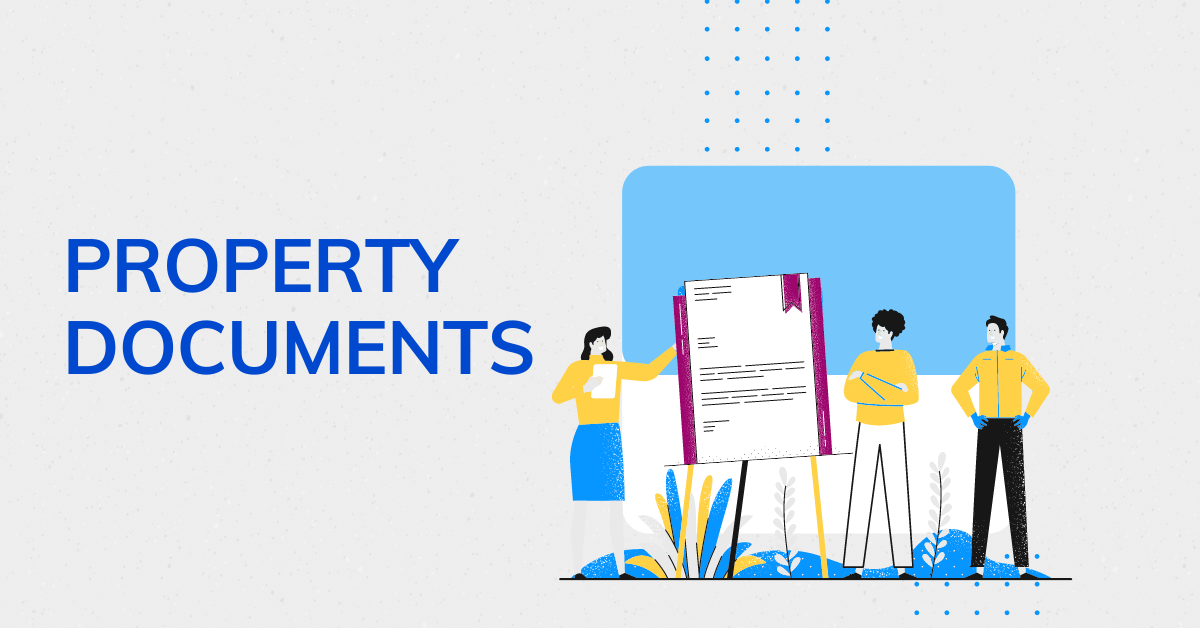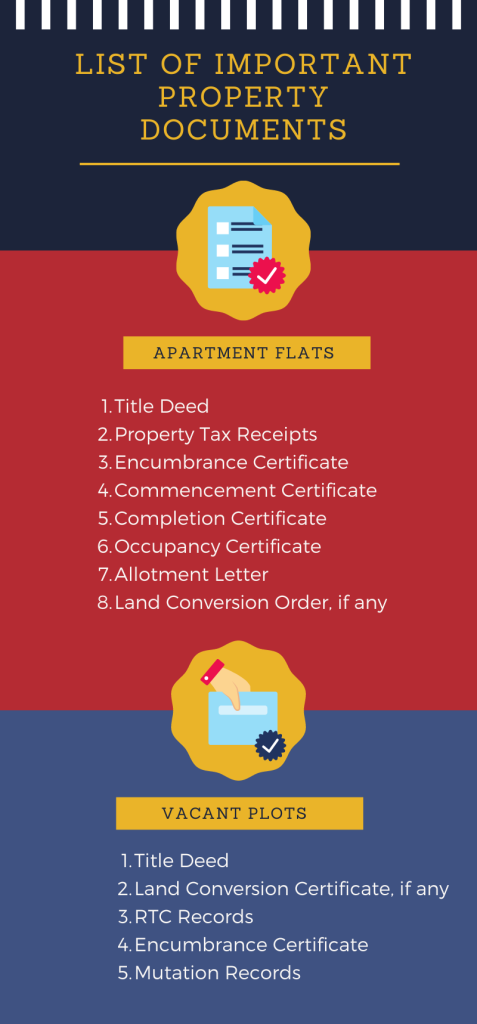
After spending months filing and furnishing different types of property documents at multiple offices, you finally get possession of your flat. However, a few years down the line, your house is declared unauthorized due to incomplete documentation. Now, you have no other option other than vacating your dream home.
This nightmare could turn into reality if you don’t verify critical documents before striking a deal with the owner or a builder. To make your home purchase process less taxing, we have collated a list of the most important property-related documents that you need to submit to local authorities or should scrutinize before proceeding with the deal.
Property Documents Required Before Signing the Home Purchase Agreement
Before purchasing a house, you need to ascertain that the concerned property has received approvals from competent authorities. Additionally, you must also ensure that property is free from financial or legal obligations. Here are some property documents which are important to verify:
1. Sale Agreement
Often used interchangeably with a sale deed, a sale agreement is a base document that defines the terms and conditions for the sale of the property. It precedes a sale deed and encompasses details like the advanced paid, price and offer details, etc. Sale agreement is one of the essential property documents which has to be submitted to apply for a home loan.
2. Allotment Letter
If you are planning to acquire an under-construction property then it is pertinent for you to obtain an allotment letter from the builder. The builder will issue the letter upon submitting 15% of the property price. Highlighted below is the significance of an allotment letter and why it forms an integral part of the property documents.
- It enumerates the basic details of the concerned property.
- Since the property amount is mentioned in the allotment letter, you can furnish it for availing a home loan.
- Construction details, the final date of delivery, terms and conditions associated, etc are also mentioned in the document.
3. Encumbrance Certificate
An encumbrance certificate is a legal document which confirms whether the concerned property is free from all legal and monetary liabilities. Apart from this, an EC is also required to avail a loan against property or for applying for a home loan. An EC can be either issued on Form 16 (when no transaction record) or Form 15 (sale, partition, lease,etc.) by the Sub-registrar’s office. Since it records all the transactions made on the real estate asset, an EC is counted amongst the most important property documents. Here are a few aspects which you can check through an EC:
- Historical info of Ownerships: Encumbrance certificate provides detailed historical information of all transactions that happened against the property, including details on ownership transfers.
- Outstanding debts and mortgages:
- Information related to liabilities such as debts and mortgages are included in an encumbrance certificate filed against a property. Checking for these outstanding obligations is necessary to ensure The property is free of significant debts that could affect its sale or transfer.
- Legal Disputes and Litigation: Details of any pending lawsuits, judgments, and court orders against the property may be disclosed by ECs. Analyzing this data aids in determining the property’s suitability for development or investment as well as the legal concerns connected with it.
- Fraudulent Activities: Signs of fraud, including forgeries, faked documents, or unapproved transactions, may be found during an examination of the EC. Early detection of these differences helps guard against fraud and keeps people from unintentionally getting involved in unlawful property transactions.
E-Encumbrance Certificate
Encumbrance Certificates are also provided in digital form. Some states facilitate this provision, allowing owners and potential buyers to view property transaction history and liability information through online platforms. This digital transformation simplifies accessing critical property documentation, reducing paperwork and processing time.
States Providing E-Encumbrance Certificates
The following states in India offer online applications for encumbrance certificates:
- Andhra Pradesh
- Kerala
- Odisha
- Puducherry
- Tamil Nadu
- Telangana
Steps to Obtain an E-Encumbrance Certificate
The process for obtaining an E-Encumbrance Certificate typically involves the following standardized steps:
- Website Access: Visit the official website of the respective state’s registration department.
- Navigation:
- Locate the Government Forms section
- Click on Stamps and Registration
- Select the Application form for the Encumbrance Certificate
- Documentation Preparation:
- Download Form 22
- Carefully fill out all required information
- Gather and attach necessary supporting documents
- Submission:
- Submit the completed application online
- Alternatively, submit to the nearest sub-registrar office
- Obtain an acknowledgment slip for reference
5. Processing and Delivery:
- Online Processing Time: Typically 2–3 working days
- Final Certificate Delivery: 6–30 working days from submission
- Certificate Validity: Valid for 30 years
4. Occupancy Certificate
To confirm whether the building in which you intend to buy a flat has passed all legal formalities, an occupancy certificate is required. The document is issued by the civic body of the concerned jurisdiction and verifies that:
- The property has been built according to the laid down standards and
- Basic amenities like water and electricity connections are in place
An occupancy certificate also required for:
- Claiming income-tax benefits on home loan along with the home loan statement.
- Serving to showcase the approved plans of the building.
- Evidence of legal recognition for occupying a property.
- Required to get a water connection/ sanitary connection or electricity supply connection.
- Necessary in the event that the buyer asks for a home loan to purchase a property.
- Time of property purchase or property selling.
- Beneficial in the event of buying or selling real estate.
- Helping a person in getting a copy of the recorded deed.
Hence, while a completion certificate is important for purchasing a property, OC is a must for legalizing occupation.
5. Completion Certificate
This certificate is issued only when the project meets the laid out plans such as the building standards, water and electricity supply connections, quality of materials used, building height, etc. As a homebuyer, you need to scrutinise the CC to understand whether the project is fit for taking possession. For builders, CC is one of the essential property documents to avail loans, keep property tax rolling, and assure the buyers that their project is free from any legal hurdles.
6. Conversion Order
Have you purchased agricultural land? Are you planning to construct a house on it? Then obtaining a conversion order/certificate is an essential requirement. A land conversion certificate is a legal document that allows the use of agricultural land for non-agricultural purposes. This order is issued by the Collector of a Deputy Collector of a concerned district.
The following types of land will not be allowed to be converted:
- Property managed by a Central or State Government Company regarding the Coastal Regulation Zone
- Land falling inside the bounds of any national highway or railroad;
- Land designated as a controlled area in any development plan notifying the State Government in accordance with the Ribbon Development Rules; and Land designated and declared as Protected Forests by the Government through its Forest Department
- Land conversion in Maharashtra is prohibited in areas related to irrigation projects, the environment, public health, peace, and safety.
7. Revenue Land Records
When you are buying a converted land or a panchayat land, then it is prudent to check the Record of Rights (RR) and Records of Rights,Tenancy and Crops (RTC). While RR describes the property types and gives the owner details, a RTC numerates upon the nature of possession of the Land, liabilities, land area, crops grown, etc.
Quick Fact: The National Council of Applied Economic Research (NCAER) launched a Land Record and Services Index (N-LRSI) to track the steps taken by different states and UT’s to digitize the land records. According to the 2020 index, Madhya Pradesh, Odisha, and Maharashtra were the top 3 performers.
Property Documents After Acquiring the Flat
Now that you have completed all the formalities before purchasing your dream home, here are some documents that you must examine post-sale.
1. Sale Deed
A type of conveyance deed, the sale deed confirms the transfer of ownership from the seller to the home buyer. To obtain the document, you need to get the property registered at the Sub-Registrar’s office of the concerned jurisdiction. Additionally, you also have to pay stamp duty and registration fees.
2. Share Certificate
A sale deed confirms the transfer of ownership from a property seller to a buyer. However, if you have acquired a flat in a housing society, then you need to obtain a document that confirms that you are a legal owner of the property. This document is called a Share Certificate.
Also referred to as a Housing Society Share Certificate, the document certifies that the concerned individual is a registered owner in the housing society and hence has a ‘share’ in the same.
It is prudent to note that the certificate has to be obtained by the homebuyer in person. Additionally, the details of both the parties should appear exactly as it had been mentioned in the original sale deed. If you intend to transfer or resell the property, then you have to return the share certificate to the society.
Quick Fact: According to the Society Registration Act of 1880, a society is formed with 7 or more individuals.
3. Possession Certificate
Simply put, a Possession Certificate is a legal document that confirms the transfer of the possession of a property from a builder to a homebuyer. This certificate is issued by a Tahsildar and Revenue Divisional Officer in rural and urban areas, respectively. In case there is a delay in the completion or delivery of a project, then you should take a Conditional Possession Certificate from the owner or builder. While a Possession Certificate states the project completion details, an Occupancy Certificate certifies that the project/building is fit for occupying.
Other Property Documents
Apart from the aforementioned certificates, here is a list of documents which you need to consider while buying a property in India.
| Property Document | Objective |
| Release Deed | A legal document which renounces one’s hold over property is called a Deed of Release. For example, when a bank returns the mortgage (here, property) to the owner once the latter pays the loan, the bank ‘releases’ the concerned party from legal obligations. |
| RERA Registration | With the enactment of the RERA act, it has become easy to confirm whether the project is registered with the concerned authorities. Hence, when you are exploring properties, then verify the project details from the concerned states’ RERA by typing the RERA registration number. |
Property Documents Summary

Note: This is a generalized list. The property documents can vary from one state and property type to another.
Applying for a Home Loan? Here’s What you Need to Submit
Enlisted are the common property documents which salaried/self-employed individuals have to submit for availing a home loan:
- Proof of Residence. This includes, but is not restricted to, Voter’s ID card, Telephone/Electricity Bill, and Ration Card.
- For identity proof, you can submit a Voter ID or Employee ID card.
- Photocopies of the property documents of the asset concerned.
- Passbook or a bank statement for viewing the last 6 months’ salary.
- Self-employed individuals have to furnish certified financial statements for the last 3 years.
- Apart from Form 16 for the previous 2 years, salaried employees also have to submit the last 6 months’ salary slips showing deductions.
Note: This list is only for indicative purposes. The property documents can vary from one bank to another.
Hence, there are scores of property documents that you must examine before and after purchasing a real estate asset. The checklist and application process can vary from one state to another; however, most of the documents remain the same throughout the country.

![Well, #GrowWithPropacity is here to educate you all about all things Real Estate.
Follow to stay updated in Real Estate!
[Real Estate, Construction, Real Estate Tips, Real Estate Growth, Real Estate Industry, Carpet Area, Super Area, Built Up Area, Home Buying Tips, Home Buyers, Property]](https://propacity.com/blogs/wp-content/plugins/instagram-feed/img/placeholder.png)
Leave a Reply